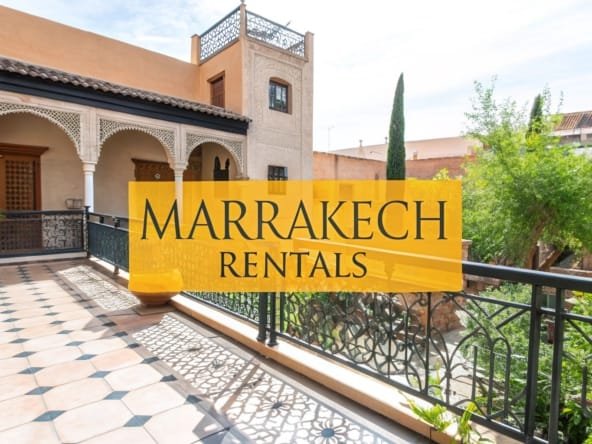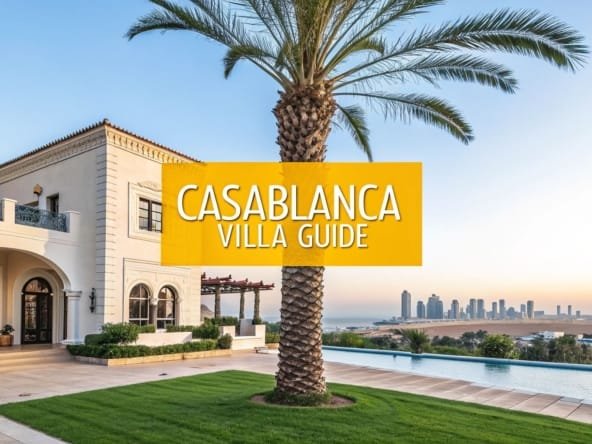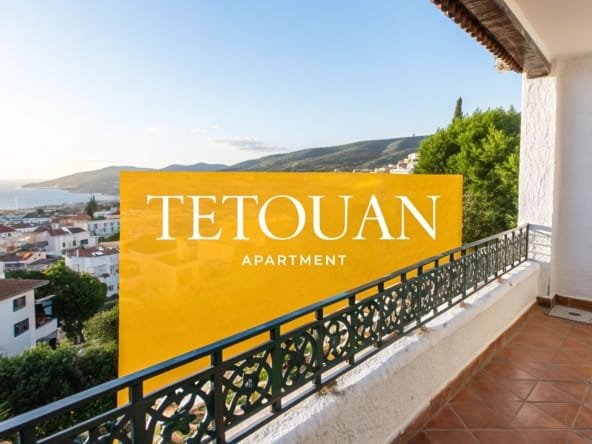Finding the right location bureau rabat is about so much more than just four walls and a door. It's about positioning your business in the very heart of Morocco's political and administrative power. Rabat offers a unique business environment, a compelling mix of modern commercial hubs and deep-rooted history, creating a wealth of opportunities for companies ready to make their mark.
Decoding the Rabat Office Rental Market
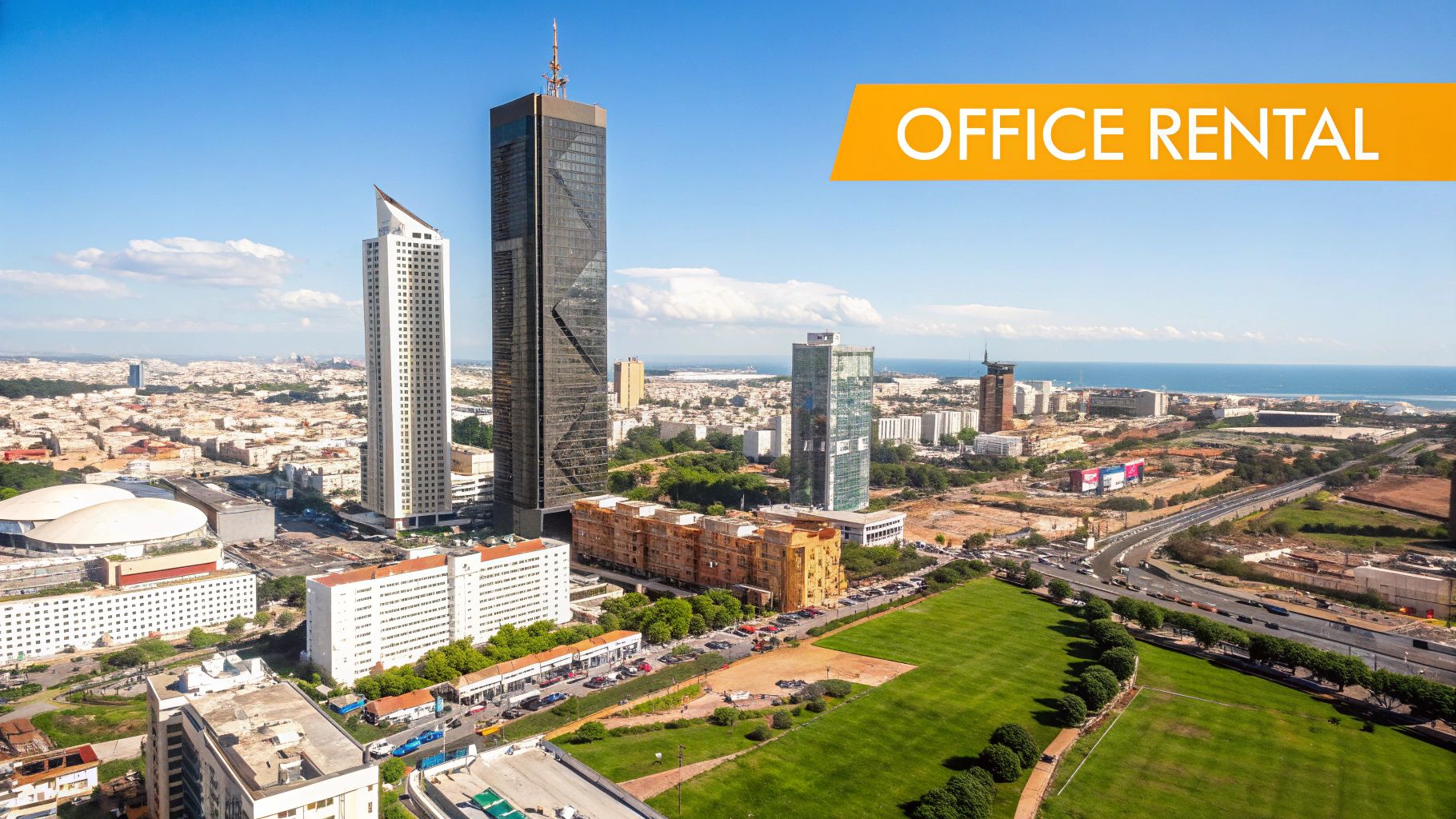
Before you even start looking at listings, it's crucial to get a feel for the pulse of Rabat's commercial property scene. This isn't Casablanca, where the market is driven almost entirely by commerce. Here, the rhythm is set by its role as the nation's capital, which creates a uniquely stable—and competitive—landscape for anyone looking to rent an office.
Think about it: every government ministry, international NGO, and foreign embassy is based here. This creates an unshakable, built-in demand for professional office space, especially in popular districts like Agdal and Hassan. If you're in a field like consulting, law, or public relations, being close to these institutions isn't just a perk; it's a fundamental part of your business strategy.
Understanding the Types of Spaces Available
One of the great things about the Rabat market is the sheer variety of spaces on offer. You'll find everything from entire floors in gleaming, modern towers to charming, character-filled offices in converted residential villas. This diversity means you can find a space that genuinely aligns with your company's culture and how you work.
- Modern Business Centres: These are concentrated in hotspots like Agdal and Hay Riad. Expect high-end amenities, secure parking, and a prestigious address. They're a natural fit for established corporations and international firms.
- Converted Villas: Tucked away in quieter, more residential areas, these spaces offer unique charm and often come with private gardens. They are a fantastic option for creative agencies or any business that wants to escape the typical corporate feel.
- Traditional Buildings: In the city’s older quarters, you can find offices in classic buildings. These get you a central location, often at a more accessible price, but they might need a bit of updating to meet modern standards.
The Forces Shaping the Market
Rabat’s steady economic and demographic growth underpins the strength of its property market. As the administrative hub for the entire Rabat-Salé-Kénitra region, its dynamic local economy is a constant. The city's designation as the administrative capital back in 1912 cemented its political importance, a legacy that continues to fuel demand for office rentals today. You can read more about Rabat's fascinating urban evolution on citiesabc.com.
Expert Insight: From my experience, vacancy rates in Rabat's prime business districts are consistently lower than in other major Moroccan cities. When a high-quality, well-located office hits the market, it doesn't stay there for long. The key is to be prepared and ready to move quickly when you find the right fit.
With this foundation, you can shift your mindset from just searching for a "location bureau rabat" to making strategic, well-informed decisions. Understanding these market dynamics will help you set a realistic budget, focus on the right neighbourhoods, and ultimately find an office that gives your business a real competitive advantage.
Choosing the Right Business Neighbourhood in Rabat
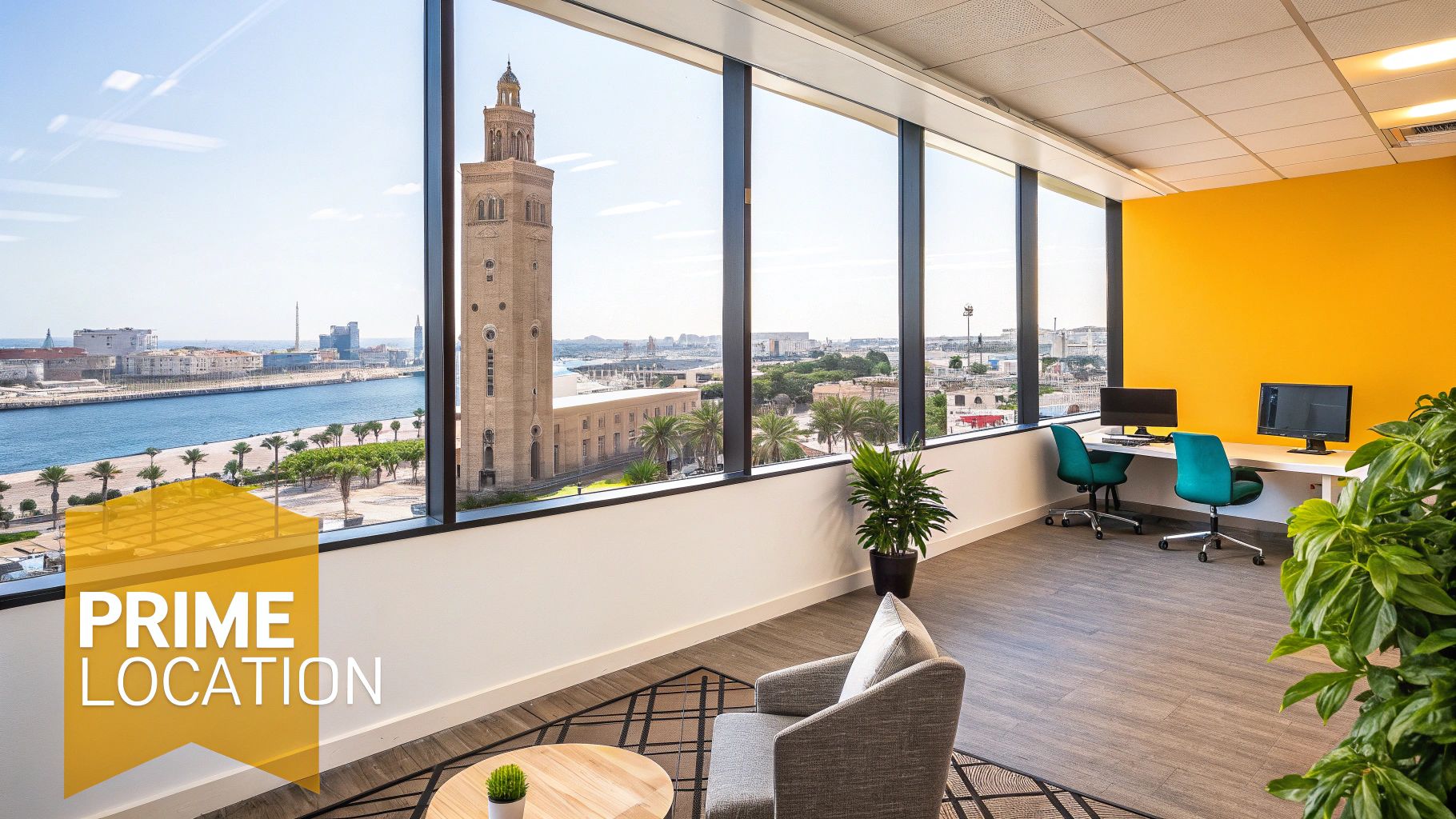
When you choose a location bureau Rabat, you're making a statement. Where you set up shop is far more than just an address on a business card—it’s a reflection of your brand's identity, a key factor in client perception, and a huge part of your team's daily life.
Think about it: a prestigious address can signal stability and success, while a space in a creative quarter might highlight innovation. This isn't just about four walls and a roof; it's about finding the perfect fit for your brand, your budget, and your day-to-day operations. For a law firm, being close to the courts is a non-negotiable. For a tech startup, a vibrant area with great cafés and transport might be the key to attracting top talent.
Agdal-Riad: The Corporate Powerhouse
If you ask anyone in Rabat where the big players are, they'll point you to Agdal-Riad. This area is the city's modern commercial heart, defined by its sleek office buildings, wide avenues, and an unmistakably upscale feel. It’s the go-to district for major national and international corporations, financial firms, and premium consultancies.
The infrastructure here is top-notch. You’ve got excellent transport links, including the tramway, and a wealth of amenities. The area is packed with high-quality cafés, fine dining restaurants, and shops, which makes it perfect for client meetings or team lunches. Frankly, an Agdal-Riad address carries a certain weight and can instantly elevate your brand's image.
Hassan: The Historic and Governmental Hub
Hassan offers a different kind of prestige—one that’s steeped in history and connected to the corridors of power. As Rabat's traditional administrative centre, it's home to countless government ministries, embassies, and cultural institutions. The architecture is a beautiful blend of colonial-era buildings and modern structures, offering office spaces with real character.
Setting up in Hassan puts you right at the centre of the action, which is a massive advantage for any business that needs to interact with the public sector. The area is always buzzing with activity. Its central location also means it’s easily accessible from just about anywhere in the city.
Key Takeaway: The blend of history and modernity here is so unique that districts like Rabat-Hassan are part of a UNESCO World Heritage site. This recognition highlights a delicate balance between preserving historical character and supporting a modern administrative city. You can learn more about its UNESCO designation.
When you're weighing your options, a side-by-side comparison can really help clarify things. Here’s a quick look at Rabat’s primary business districts to help you pinpoint the best location for your needs.
Rabat Business Neighborhood Comparison
| Neighborhood | Best For | Average Rent | Key Features |
|---|---|---|---|
| Agdal-Riad | Established corporations, tech firms, financial services | Higher | Prestige, modern amenities, excellent infrastructure, networking opportunities |
| Hassan | Law firms, NGOs, government consultants | Moderate | Proximity to government bodies, historic character, central access, cultural landmarks |
| Souissi | Creative agencies, wellness centres, exclusive consultancies | Varies (often higher) | Tranquil environment, privacy, unique villa-style offices, green spaces |
Each neighbourhood tells a different story. The right choice depends on the story you want your business to tell.
Emerging and Niche Districts
Beyond the two main hubs, it's worth looking at some of Rabat's other distinct neighbourhoods.
Souissi, for example, is a much leafier, more residential district known for its elegant villas. Many of these have been converted into exclusive office spaces. This offers a much quieter, more private setting that could be the perfect backdrop for a creative agency, a private clinic, or a consultancy that values discretion.
Ultimately, finding the right neighbourhood is about aligning your location with your business goals. By understanding what makes each district tick, you can make a strategic choice that supports your operations, boosts your brand, and creates a great working environment for your team.
For a deeper dive, you can explore our insights into why Rabat is a premier real estate destination to get a complete picture of the city's appeal.
Navigating the Office Rental Process Like a Pro
Finding the right office in Rabat is more than just a real estate transaction; it's a strategic business move. Locally, the process is known as location bureau rabat, and approaching it with a clear plan is what separates a good choice from a great one. This isn't something you rush into. The best outcomes I've seen always start with careful internal planning, long before the first property tour.
Before you even think about contacting an agence immobilière or browsing listings, your first job is to look inward. You need an almost painfully clear picture of what your business actually requires. This goes far beyond just counting desks. Think about your team's workflow. Does your team thrive in a buzzing, open-plan space, or do you need the focus of private, sound-proofed offices?
Getting this foundation right makes every subsequent step smoother and more effective. The image below breaks down this initial discovery phase into three key areas.
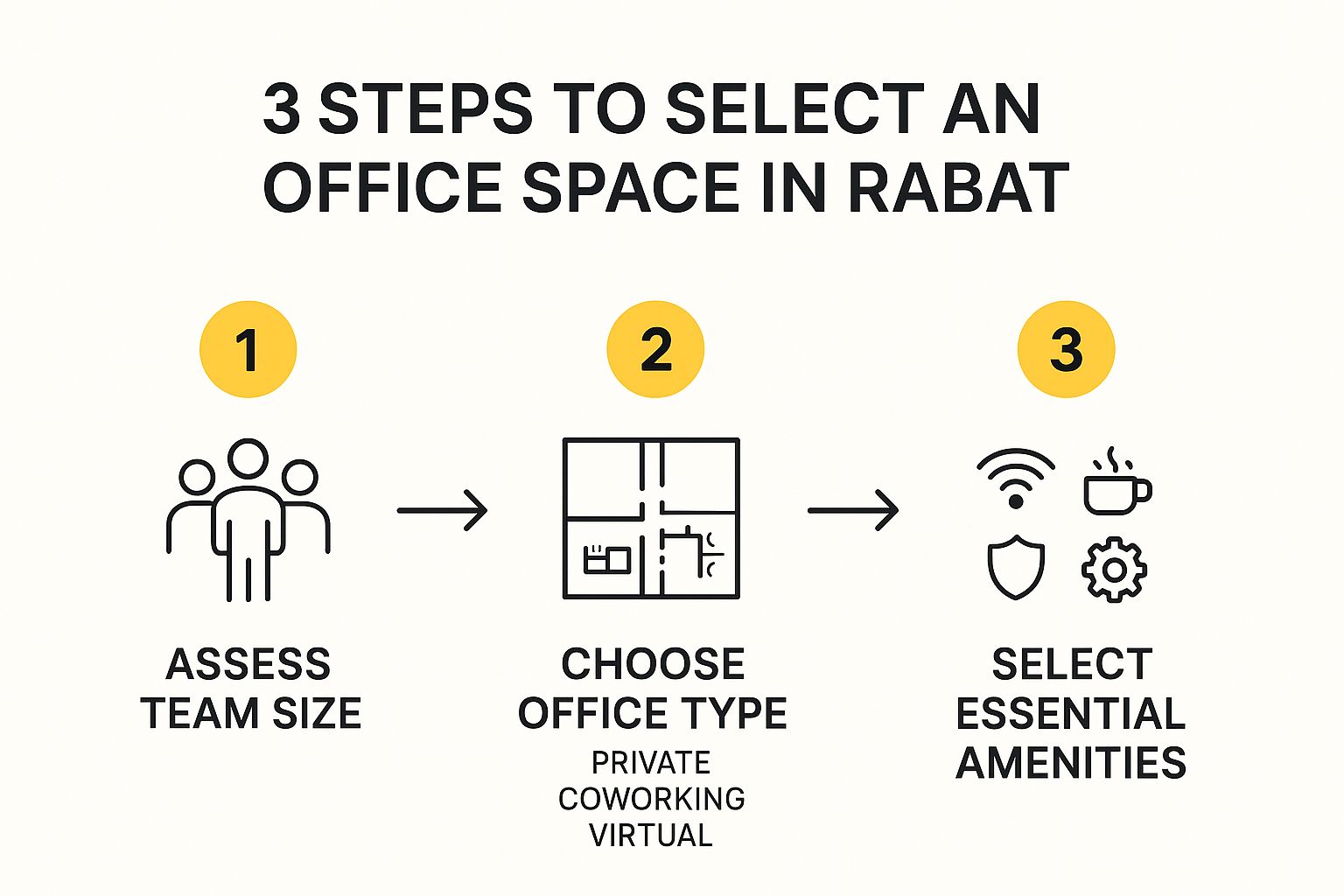
As you can see, understanding your team's needs is the starting point. It dictates the office style you should look for and which amenities are genuine must-haves, helping you avoid wasting time on properties that simply won't work.
Sourcing and Vetting Potential Spaces
With your detailed requirements in hand, you’re ready to start the hunt. Online portals are a great starting point for getting a feel for the market, but I can't overstate the value of a good local real estate agent. These professionals have on-the-ground knowledge and, crucially, access to listings that might not be publicly advertised.
When you begin visiting spaces, treat each viewing like an investigation. Don't just look; ask the tough questions.
- Parking and Access: How many dedicated parking spots come with the space? For employees and clients using public transport, how close is the nearest tramway stop?
- Building Management: Who is the building manager (syndic)? What are the monthly fees, what exactly do they cover, and how responsive are they?
- Future Growth: What are the rules on branding or making small modifications? Could the space accommodate your team if it grows in the next few years?
Expert Tip: From experience, I can tell you that infrastructure is everything. A beautiful office with spotty internet or too few power outlets will become a source of constant headaches. During your walkthrough, physically test things. Check the mobile signal, look at the state of the air conditioning, and count the outlets.
Negotiation and Finalising the Lease
You've found the perfect spot. Now comes the negotiation. In the Rabat market, it’s worth remembering that the asking price is often a starting point, not a final number. A longer lease commitment can give you significant leverage here.
The final hurdle is the commercial lease agreement, or bail commercial. This is the most critical document in the entire process. Read it carefully. Pay special attention to clauses covering rent increases, renewal options, and conditions for ending the lease. I always recommend having a legal expert review the contract before you sign anything. It's a small investment that can save you from major issues down the line.
Tackling the rental process with this level of diligence means you're not just finding an office—you're securing a genuine asset for your business. To see what's currently on the market, feel free to browse our handpicked selection of office space rentals in Rabat.
Mastering Your Budget for an Office in Rabat
The price you see advertised for a location bureau rabat is really just the starting point. It’s what I call the "headline rent," but it’s far from the full story. To avoid any nasty surprises down the line, you need to dig deeper and figure out your Total Cost of Occupancy (TCO), which is the true, all-in cost of having that office space.
Trust me, overlooking these "hidden" expenses is the most common mistake I see businesses make. It can quickly sour what seemed like a great deal, turning your new office into a financial headache.
Beyond the First Month's Rent
Before you even get the keys, you'll have some significant upfront costs.
First, landlords in Rabat almost always ask for a security deposit. Plan on setting aside two to three months' rent for this. It's refundable, of course, but it’s still cash you need to have ready.
Then, if you’re working with a real estate agent (agence immobilière)—which I highly recommend for navigating the market—there’s their commission. Typically, this is one month's rent, but the good news is you usually split it 50/50 with the landlord.
The Ongoing Costs No One Talks About
Once you're settled in, a new set of recurring bills will start to arrive alongside your monthly rent. It's absolutely crucial to get clarity on these before you sign anything.
- Frais de Syndic: This is a big one. These are the building's service charges, covering everything from the security guard at the front desk to cleaning the lobby and maintaining the lifts. They are non-negotiable and can vary dramatically from one building to another.
- Utilities: Your electricity, water, and internet bills are entirely on you. Don't be shy about asking the landlord or the current tenant for past bills to get a realistic estimate of what you'll be paying.
- Business Taxes: Remember to account for Morocco's business taxes. The two main ones are the taxe professionnelle (professional tax) and the taxe de services communaux (municipal services tax). Both are calculated based on your office's rental value and are paid annually.
Expert Insight: I always push my clients to ask for a full 12-month breakdown of the 'frais de syndic' and utility costs. A single month's bill can be misleading. You need to see the full year to account for seasonal spikes, like running the air conditioning nonstop during the hot Rabat summer.
Putting It All Together: A Sample Cost Breakdown
To help you compare different properties apples-to-apples, it's smart to map out all the potential costs. Here’s a quick look at what a typical monthly budget might involve, beyond just the rent.
Estimated Monthly Office Costs in Rabat
| Expense Item | Estimated Cost Range (MAD) | Notes |
|---|---|---|
| Security Deposit | 2-3 months' rent | One-time, refundable |
| Agency Commission | 50% of one month's rent | One-time, non-refundable |
| 'Frais de Syndic' | 500 – 2,500+ / month | Varies greatly by building |
| Utilities (Water/Elec) | 800 – 3,000+ / month | Depends on usage and size |
| 'Taxe Professionnelle' | Varies (Annual) | Based on rental value |
Thinking of your office space as a serious financial commitment is the right mindset. This approach is fundamental to successful property investment in Morocco, where a comprehensive understanding of all costs is the foundation of a profitable venture.
By taking a little extra time to build a complete and realistic budget, you ensure your new Rabat office truly works for you—powering your growth instead of draining your resources.
Getting Your Paperwork in Order for a Commercial Lease
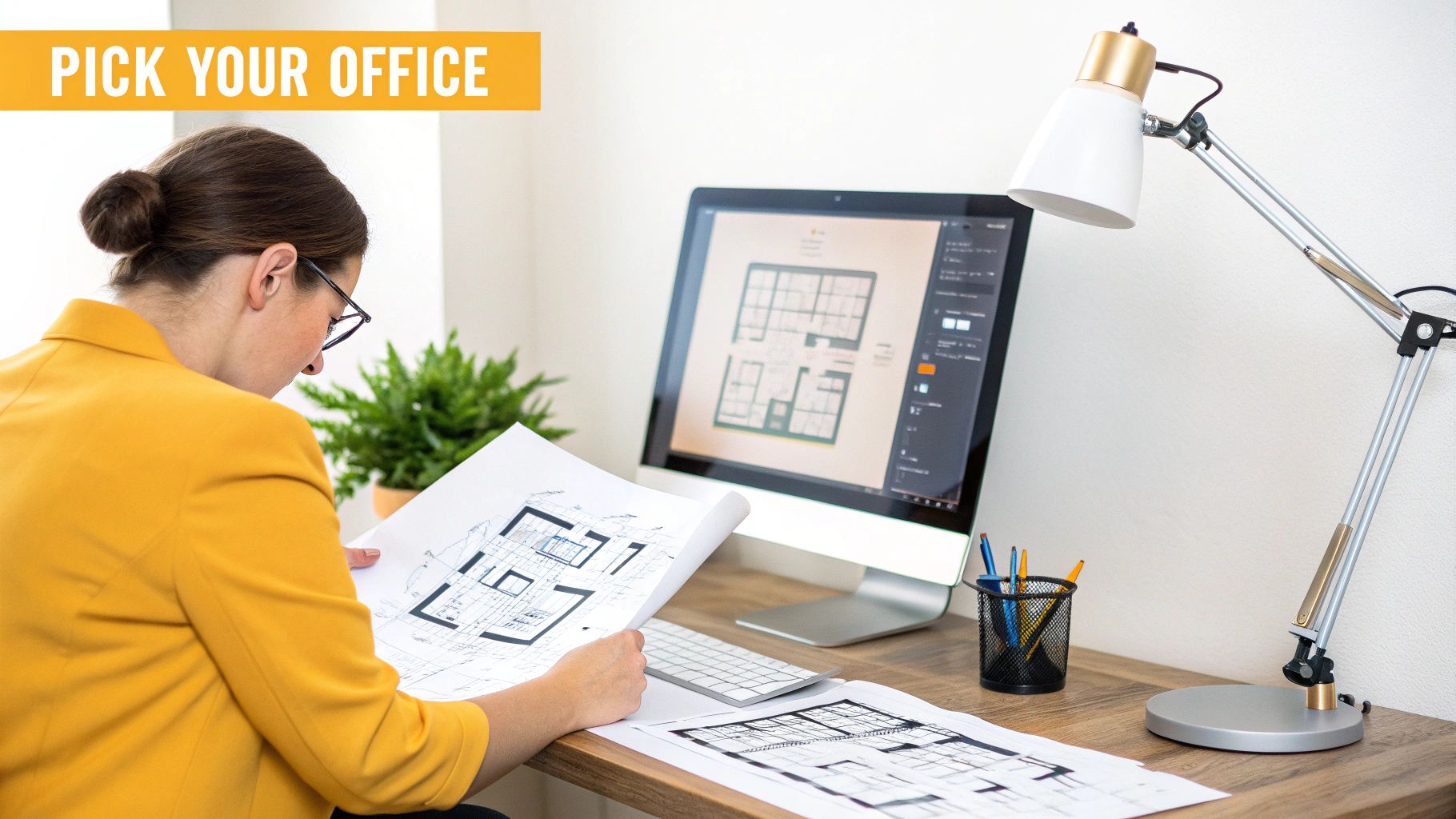
When you're searching for a location bureau rabat, walking into a negotiation prepared is your biggest asset. Landlords and their agents always favour tenants who have their affairs in order. It’s a clear sign of professionalism and shows you’re a serious contender.
Having your paperwork ready from the start does more than just speed things up. It gives you a real competitive advantage, especially when a prime office space has multiple businesses vying for it. Think of it as building a case for your business—each document proves your legitimacy and your ability to meet the lease terms. A well-organised file can genuinely be the one thing that convinces a landlord to choose you.
Rabat’s long history as a centre of governance, stretching back to its 12th-century origins and covering 1,275 square kilometres today, has instilled a deep respect for procedure. You can learn more about Rabat's incredible historical background on Britannica.com. This culture is very much alive in its business dealings, where proper documentation isn't just a formality; it's essential.
The Core Company Documents
For any business, a few official records are absolutely non-negotiable. These are the documents that prove your company is a legally registered and active entity in Morocco. Before you even think about signing a lease, make sure you have certified copies ready.
- 'Registre de Commerce' (RC): This is your company's official entry in the commercial registry. It's the foundational proof of your business's legal existence.
- 'Identifiant Fiscal' (IF): Your unique tax ID number. It's required for virtually all financial transactions in Morocco, including your lease agreement.
- Company Statutes ('Statuts de la Société'): These legal documents detail your company's purpose, structure, and internal governance. Crucially, they show who has the legal authority to sign contracts on the company's behalf.
Expert Insight: I’ve personally witnessed promising deals collapse over something as simple as an outdated document. Make sure your RC extract is recent. Most landlords will ask for one that's less than three months old. Paying attention to this small detail shows you’re on top of your game.
Proving Personal Identity and Authority to Sign
Beyond the corporate file, the person who will actually sign the lease needs to provide their own identification. The landlord needs to know exactly who is legally committing the company to this long-term financial obligation.
You'll need a valid copy of a national identity card ('Carte Nationale d'Identité' or CNI) if you are a Moroccan citizen. For foreign nationals, it's a passport and a residency card ('Carte de Séjour').
Just as important is the proof of signing authority. This is usually defined in the company statutes, but if not, a specific power of attorney document, known as a 'procuration', will be required. Having these papers ready from the outset prevents those frustrating last-minute hurdles and keeps the whole process moving forward smoothly.
Common Questions About Renting an Office in Rabat
Diving into the location bureau Rabat market naturally brings up a few questions. Getting straight answers is key to moving forward with confidence and avoiding any last-minute surprises when you're ready to sign. Let's walk through some of the most common queries we get from businesses just like yours.
What Is a Typical Lease Duration in Rabat?
Traditionally, commercial leases in Rabat—known locally as a bail commercial—are structured on a '3-6-9' year model. This has long been the standard, offering stability and long-term security for both the business and the property owner. It’s a framework that the local business community knows and trusts.
But the market is definitely evolving. We're seeing more and more flexibility, with shorter leases of one to three years becoming quite common. This is especially true for startups, smaller businesses, or international companies that want to test the waters in Morocco before making a long-term commitment. The most important thing is to negotiate a term that genuinely fits your business plan.
Are Office Rental Prices Negotiable?
Absolutely. Think of the advertised rent (loyer) as the opening bid, not the final price. Your power to negotiate a better deal hinges on a few things: the property's popularity, how long it’s been on the market, and—most importantly—the length of your proposed lease.
Landlords are far more inclined to give a discount to a tenant ready to sign for several years versus one who’s only staying for twelve months. This is where having a local agent in your corner really pays off; they know the going rates and can handle the negotiation to secure you the best possible terms.
Key Insight: A good rule of thumb is to never take the first price. It's standard practice to come back with a reasonable counter-offer. If you can back it up with market data or the promise of a longer tenancy, you can often achieve savings that make a real difference over the life of the lease.
Do I Need a Lawyer to Review My Lease?
While it’s not legally mandatory, I highly recommend it. Having a legal expert, like a lawyer or a specialised notaire, look over your bail commercial before you sign is a smart investment. Moroccan commercial law has nuances that are easy for an untrained eye to miss.
A professional review ensures you grasp every single clause. This is especially critical for terms covering rent escalations, your rights to renew, maintenance duties, and the conditions for ending the lease. It’s a small upfront cost that provides significant protection for your business down the road.
What Are 'Frais de Syndic' and Are They Included?
This is a big one. The 'frais de syndic' are the building’s common area maintenance and management fees, and they are almost always separate from your base rent. You have to factor them into your budget.
These fees typically cover essential services like:
- Building security guards
- Cleaning of lobbies, lifts, and hallways
- Lift maintenance and electricity for shared spaces
- General upkeep of the building's exterior and landscaping
You'll pay these charges monthly or quarterly to the building's management committee, or syndic. When you're looking at a space, always ask for the exact amount of the frais de syndic. They are a significant and recurring operational cost you need to be aware of from day one.
Navigating the Rabat real estate market requires local expertise and a trusted partner. At Rich Lion Properties, we provide the guidance you need to find the perfect commercial space for your business. Explore our services and discover how we can simplify your search at https://richlionproperties.com.

